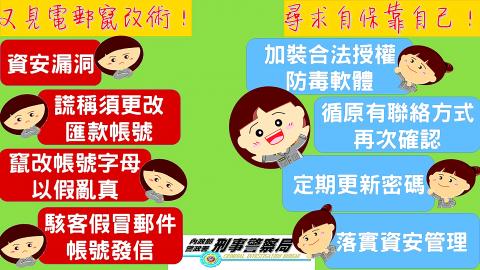A digital expert on Friday urged people to regularly change their passwords or security patterns on their cellphones, computers and tablets to better protect their information.
The warning came amid concern that telecommunications equipment from China’s Huawei Technologies Co (華為) allegedly contains “backdoors” that could allow the Chinese military to conduct espionage.
Varying degrees of bans on Huawei products exist in the US, Australia, New Zealand and Japan, while Taiwan in 2013 banned the use of core telecoms equipment manufactured by Chinese companies.

Photo provided by the Criminal Investigation Bureau
The Industrial Technology Research Institute and the Institute of Information Industry have announced that their internal networks do not support Huawei phones or computers.
Lin Hsin-hsu (林信旭), who is better known as Lin Hsiao-hsu (林小旭), said that information is constantly being uploaded to company servers regardless of whether a person is using Facebook or Google, or a cellphone, tablet or computer.
Data uploaded include registration information, membership information and cellphone builds, he said, adding that this is what enables cellphones to download updated software.
Therefore, Chinese cellphone firms, such as Huawei or Xiaomi, are transmitting data back to their company servers, which could be a security concern, Lin said.
Information technology companies say that data collection is used to improve their products, Lin said, adding that nowadays it would be very difficult to block or prevent one’s data from being uploaded, unless one cuts themselves off from the Internet.
Regularly changing security patterns and passwords and avoiding phishing Web sites would go a long way to protect personal information, he said.
It would be hard to prove what companies are doing with the collected data, but consumers should be wary, a source in the IT industry said.
It is common knowledge that government agencies are on the alert, but further discussion on whether all Chinese brands should be placed under scrutiny should be conducted, the source said
Methods, such as preventing Chinese-brand phones with camera functions from being imported, should be discussed, as cellphone cameras could be hacked and used to take photographs even when the screen is off, the source said.

Taiwanese can file complaints with the Tourism Administration to report travel agencies if their activities caused termination of a person’s citizenship, Mainland Affairs Council Minister Chiu Chui-cheng (邱垂正) said yesterday, after a podcaster highlighted a case in which a person’s citizenship was canceled for receiving a single-use Chinese passport to enter Russia. The council is aware of incidents in which people who signed up through Chinese travel agencies for tours of Russia were told they could obtain Russian visas and fast-track border clearance, Chiu told reporters on the sidelines of an event in Taipei. However, the travel agencies actually applied

Japanese footwear brand Onitsuka Tiger today issued a public apology and said it has suspended an employee amid allegations that the staff member discriminated against a Vietnamese customer at its Taipei 101 store. Posting on the social media platform Threads yesterday, a user said that an employee at the store said that “those shoes are very expensive” when her friend, who is a migrant worker from Vietnam, asked for assistance. The employee then ignored her until she asked again, to which she replied: "We don't have a size 37." The post had amassed nearly 26,000 likes and 916 comments as of this

New measures aimed at making Taiwan more attractive to foreign professionals came into effect this month, the National Development Council said yesterday. Among the changes, international students at Taiwanese universities would be able to work in Taiwan without a work permit in the two years after they graduate, explainer materials provided by the council said. In addition, foreign nationals who graduated from one of the world’s top 200 universities within the past five years can also apply for a two-year open work permit. Previously, those graduates would have needed to apply for a work permit using point-based criteria or have a Taiwanese company

The Shilin District Prosecutors’ Office yesterday indicted two Taiwanese and issued a wanted notice for Pete Liu (劉作虎), founder of Shenzhen-based smartphone manufacturer OnePlus Technology Co (萬普拉斯科技), for allegedly contravening the Act Governing Relations Between the People of the Taiwan Area and the Mainland Area (臺灣地區與大陸地區人民關係條例) by poaching 70 engineers in Taiwan. Liu allegedly traveled to Taiwan at the end of 2014 and met with a Taiwanese man surnamed Lin (林) to discuss establishing a mobile software research and development (R&D) team in Taiwan, prosecutors said. Without approval from the government, Lin, following Liu’s instructions, recruited more than 70 software